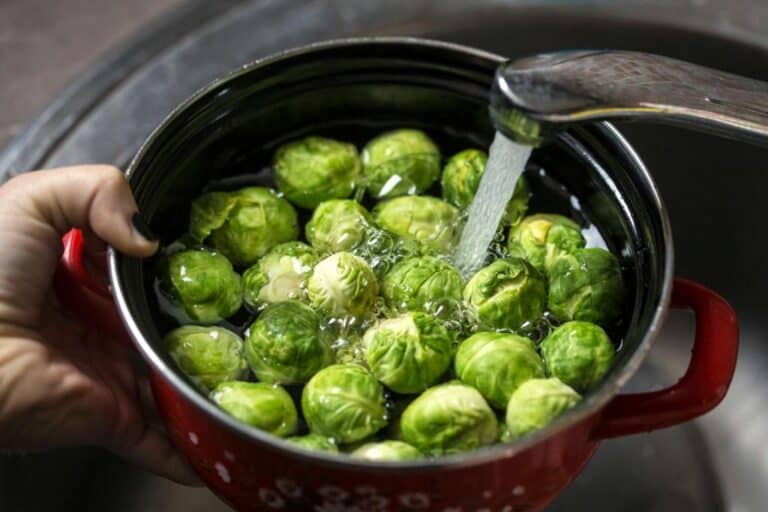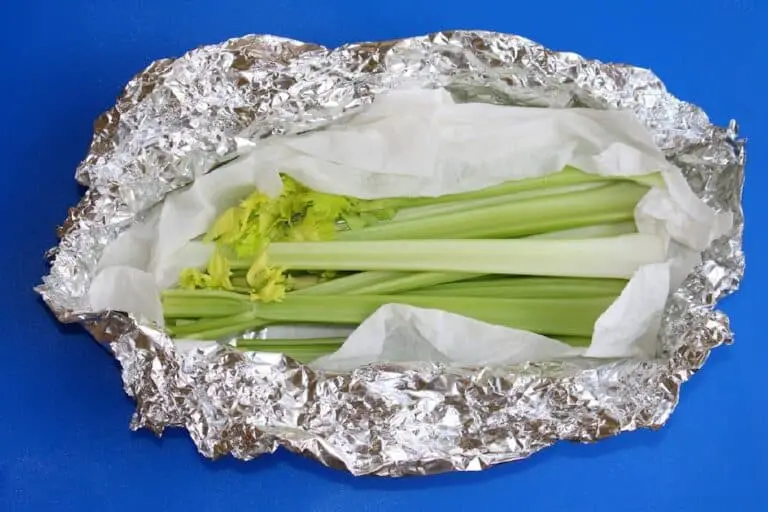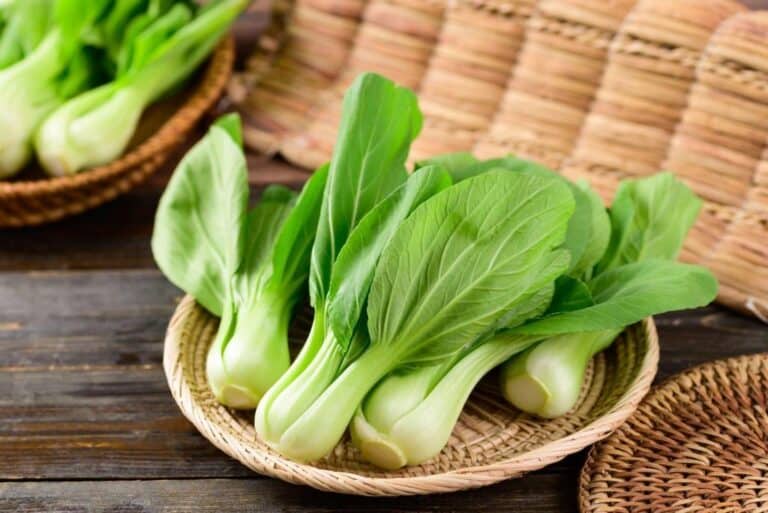Why Does My Cucumber Taste Like Soap, Shampoo, or Chemicals?
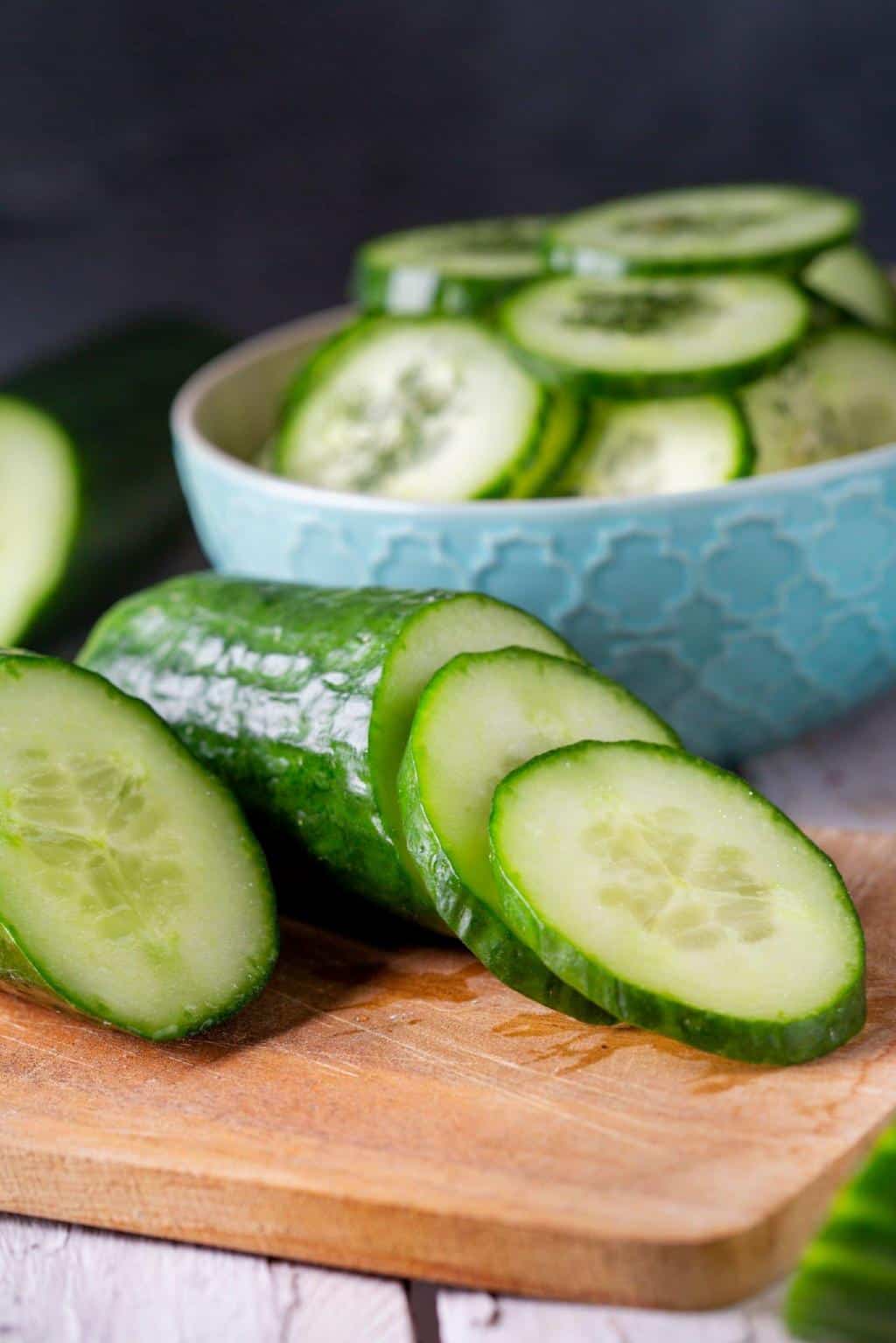
Ever reached for that perfectly green, crisp cucumber, only to be taken aback by an unexpected soapy or chemical taste? Fear not, dear cucumber enthusiasts, for we’re about to embark on a journey into the intriguing world of cucumbers and their curious taste alterations.
In this article, we’ll dive deep into the science behind this culinary enigma, exploring the mysterious compounds responsible for turning your cucumbers from sweet to bitter. From the role of genetics and growing conditions to the secrets of avoiding the dreaded chemical flavor, we’ll equip you with all the knowledge you need to ensure your next cucumber encounter is nothing short of delightful.
So, let’s peel back the layers of this soapy sensation and unlock the secrets behind “Why Does My Cucumber Taste Like Soap, Shampoo, or Chemicals?”
Understanding Sensory Perception and Taste
Have you ever taken a bite of a fresh cucumber only to be met with an unexpected soapy or chemical taste? It’s a perplexing experience that has left many wondering about the science behind it. To unravel this mystery, let’s delve into the fascinating world of sensory perception and taste.
Our taste buds play a crucial role in detecting flavors. These tiny receptors on our tongues are sensitive to different compounds, allowing us to discern the sweet, sour, bitter, salty, and umami tastes. But sometimes, our taste buds can be tricked, leading to peculiar flavor perceptions, like cucumbers tasting like soap or shampoo.
The Science Behind the Soapy Taste in Cucumbers
To understand why cucumbers occasionally have a soapy taste, we need to explore their chemical composition. Cucumbers contain various compounds, and some of these compounds can be responsible for altering the taste.
Scientists have identified specific compounds in cucumbers that contribute to the soapy taste. The interaction between these compounds and our taste receptors can create an unexpected flavor sensation.
Additionally, external factors such as environmental conditions, the maturity of the cucumber, and post-harvest handling can influence the intensity of the soapy taste.
Why Does My Cucumber Taste Like Soap, Shampoo, or Chemicals?
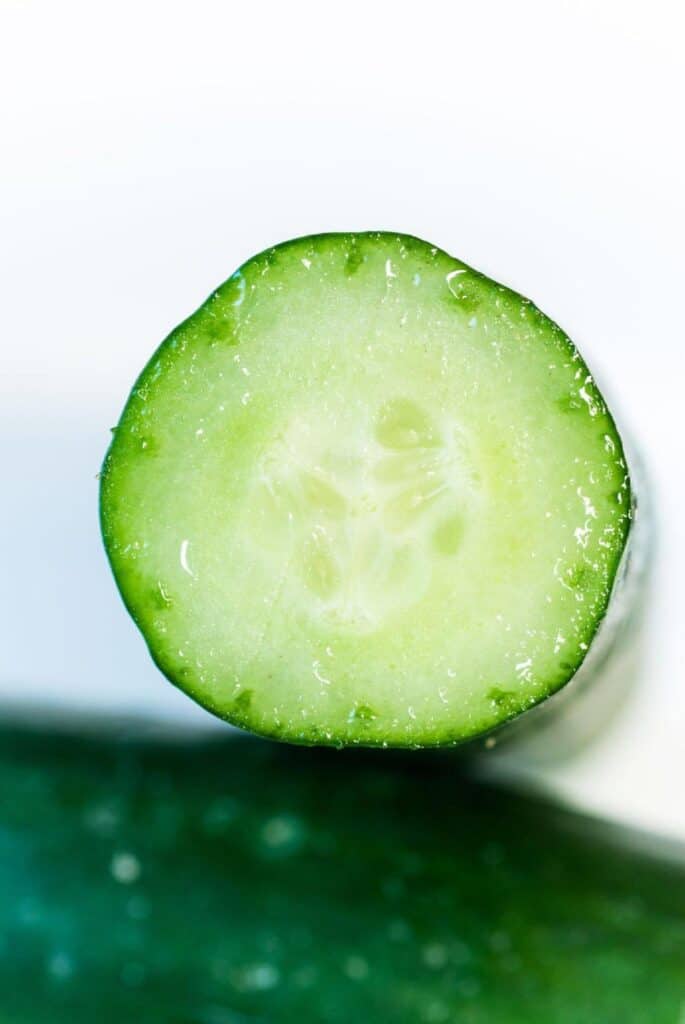
If your cucumber tastes like soap, shampoo, or chemicals, there could be several reasons for this. Here are some possible explanations:
- Cucurbitacin: Cucumbers have a chemical compound named cucurbitacin, which contributes to bitterness or a chemical taste. Cucurbitacin is natural and has a bitter taste, but it can be more concentrated in cucumbers that have been exposed to adverse growing conditions, such as a lack of water or excessive heat.
- Contamination: If a cucumber tastes like soap or shampoo, it may have been contaminated with a cleaning product or other substance that has a similar taste. Contaminated irrigation water containing chemicals or pollutants can affect the taste of cucumbers.
- Toxic squash syndrome: This is a rare condition that can occur when people eat cucurbits, such as cucumbers, that contain high levels of cucurbitacin. Symptoms can include nausea, vomiting, and diarrhea.
- Fertilizers: Excessive use of fertilizers or certain types of fertilizers can introduce unwanted chemicals into the cucumber’s growth environment.
- Environmental stress: Cucumbers that are subjected to environmental stresses during growth, such as extreme temperatures, drought, or nutrient imbalances in the soil, may produce more cucurbitacins.
- Age of Cucumber: The age of the cucumber at the time of harvest is another critical factor. As cucumbers ripen, their cucurbitacin content tends to increase, resulting in a more bitter taste. Generally, the younger the cucumber, the milder the flavor.
Are Soapy Cucumbers Safe to Eat?
If your cucumber tastes soapy, you might be wondering if it is safe to consume. The good news is that soapy cucumbers are not toxic, and eating them is generally safe for most people. However, the taste can be off-putting, making it less enjoyable to eat.
If you encounter a bitter cucumber and the taste is too unpleasant for your liking, it’s best to avoid consuming the entire fruit. Cutting off the ends of the cucumber, where the cucurbitacins tend to concentrate, can reduce the bitterness. Alternatively, you can peel the cucumber to minimize the unwanted taste.
While cucurbitacins are not harmful in small amounts, excessively bitter cucumbers may lead to stomach discomfort or digestive issues for some individuals. If you have a sensitive stomach or are prone to gastrointestinal problems, it’s wise to exercise caution.
Can You Prevent Cucumbers from Tasting Soapy?
Though you can’t completely eliminate the risk of encountering a soapy cucumber, several strategies can increase the likelihood of enjoying a delightful, sweet cucumber every time:
- Choose the Right Cucumber: Opt for known cultivars that are bred to be less bitter, such as the English or Persian cucumber varieties.
- Homegrown Cucumbers: If you have the space and inclination, try growing your own cucumbers. You can control the growing conditions and harvesting time to ensure a milder taste.
- Purchase from Local Farmers: Local farmers’ markets often offer freshly harvested cucumbers that are less likely to have high cucurbitacin levels compared to supermarket cucumbers that might have been stored for an extended period.
- Peeling and Seeding: As mentioned earlier, peeling the cucumber and scooping out the seeds can significantly reduce the bitterness.
- Blanching Technique: Some people use a blanching technique to reduce the bitterness. It involves cutting the ends of the cucumber and briefly soaking them in hot water.
- Remove Bitter Ends: If you encounter bitterness while eating a cucumber, cut off the ends and taste the cucumber again. The bitterness usually concentrates in the stem and blossom ends.
- Pairing and Preparation: Combine cucumbers with other ingredients that complement their taste, such as mint, lemon, or yogurt. Turning them into refreshing salads or adding them to sandwiches can enhance the overall flavor.
Remember that cucumbers are a healthy and hydrating addition to your diet. Don’t let the occasional soapy cucumber discourage you from enjoying their numerous benefits!
Allergies and Sensitivities to Cucumbers
While cucumbers are generally considered safe and nutritious, some individuals may experience allergies or sensitivities to them. In this section, we’ll explore cucumber allergies, symptoms, and management.
Overview of Cucumber Allergies and Sensitivities
Cucumber allergies are relatively rare but can occur due to proteins present in the vegetable. People with oral allergy syndrome may also experience sensitivity to cucumbers due to cross-reactivity with certain pollen.
Common Symptoms and Reactions
Allergic reactions to cucumbers can vary from mild to severe and may include:
- Itching or Tingling: Sensations in the mouth, lips, or throat after consuming cucumbers.
- Swelling: Swelling of the lips, tongue, or throat, which can lead to difficulty in breathing.
- Skin Reactions: Skin rashes, hives, or itching after handling or consuming cucumbers.
Cross-reactivity with Other Allergens
Individuals with pollen allergies, especially to ragweed or birch, may experience cross-reactivity when consuming cucumbers. This is known as oral allergy syndrome, where proteins in cucumbers resemble those in pollen, triggering allergic reactions.
WARNING
If you suspect an allergy or sensitivity to cucumbers, consider the following steps:
Avoidance: Eliminate cucumbers and related foods from your diet to prevent allergic reactions.
Consult an Allergist: If you experience severe symptoms or are unsure about your condition, seek advice from an allergist for proper diagnosis and management.
Tips for Enhancing Cucumber Flavor in Cooking and Storage
To enjoy the best cucumber taste, how you handle, cook, and store them matters. In this section, we’ll explore some handy tips to enhance cucumber flavor and keep them fresh and delicious.
Culinary Techniques to Improve Cucumber Taste
Cucumbers can be a versatile addition to various dishes, and some culinary techniques can enhance their flavor:
- Marination: Marinating cucumbers in acidic dressings or vinegar-based solutions can infuse them with delightful flavors.
- Pickling: Pickling cucumbers in brine not only preserves them but also imparts a tangy and savory taste.
Complementary Ingredients to Enhance Flavor
Pairing cucumbers with compatible ingredients can create exciting flavor combinations:
- Herbs and Spices: Fresh herbs like dill, mint, or basil, along with spices like black pepper or cumin, can elevate the taste of cucumber.
- Citrus Fruits: Squeezing a dash of lemon or lime juice over cucumber salads can add a refreshing zing.
Proper Storage Methods for Preserving Cucumber Taste
Improper storage can lead to a decline in cucumber taste. Here’s how to keep them at their best:
- Refrigeration: Store cucumbers in the refrigerator’s crisper drawer to maintain their freshness and crispness.
- Separate from Ethylene Producers: Keep cucumbers away from ethylene-producing fruits like apples, as it can accelerate their spoilage.
Best Practices for Cooking Cucumbers
Cucumbers can be cooked in various ways, but some methods preserve their taste better:
- Quick Cooking: Opt for quick-cooking methods like stir-frying or sautéing to retain their natural flavor and crunch.
- Minimal Seasoning: Use minimal seasoning to avoid overpowering the delicate cucumber taste.
Conclusion
Next time you encounter a cucumber that tastes like soap, shampoo, or chemicals, you can confidently explain the mysterious occurrence to your friends and family. Cucurbitacins, the natural defense compounds found in cucumbers, are responsible for the occasional bitter and soapy flavor.
Understanding the factors that influence the cucurbitacin levels in cucumbers, such as genetics, growing conditions, and maturity, empowers you to make informed choices when selecting and consuming cucumbers.
If you happen to come across a bitter cucumber, fear not! It may not be the most enjoyable experience, but it is generally safe to eat. Simply employ the tips and tricks mentioned above to minimize the bitterness and enhance your cucumber-eating pleasure.
So, the next time you bite into a cucumber, savor its refreshing taste, and remember the fascinating science behind this everyday vegetable.
FAQs on Cucumber Taste Like Soap, Shampoo, or Chemicals
Can cucumbers make you sick if they taste like chemicals?
Cucumbers with a chemical taste are generally safe to eat in small amounts, but if the flavor is too strong, it’s best to avoid consuming the entire cucumber. High levels of pesticides or agricultural chemicals could lead to mild digestive discomfort for some individuals.
What causes cucumbers to taste bitter or soapy?
Cucurbitacins, natural defense compounds present in some cucumbers, are what cause bitter or soapy cucumbers. Genetics, growing conditions, and cucumber maturity influence the concentration of these compounds.
Can I still eat cucumbers that taste like soap?
If your cucumber tastes soapy, it’s safe to eat in moderation, but you may want to remove the bitter ends or peel it to improve the taste.
How can I prevent cucumbers from tasting like chemicals?
To prevent cucumbers from tasting like chemicals, choose cultivars known for their milder flavor and opt for locally grown or homegrown cucumbers with minimal pesticide exposure.
Is it safe to eat cucumbers with a soapy or chemical taste?
Consuming cucumbers with a soapy or chemical taste is generally safe, but it’s best to avoid eating large quantities to prevent any potential stomach discomfort.
How do pesticides and agricultural chemicals affect cucumber taste?
Pesticides and agricultural chemicals can impact cucumber taste, as residues may interact with natural compounds, leading to unexpected flavors.
Can cucumber taste variation be an indicator of overall food safety?
While cucumber taste variation may not directly indicate overall food safety, it can signal potential exposure to agricultural chemicals, emphasizing the importance of choosing wisely when selecting cucumbers for consumption.

